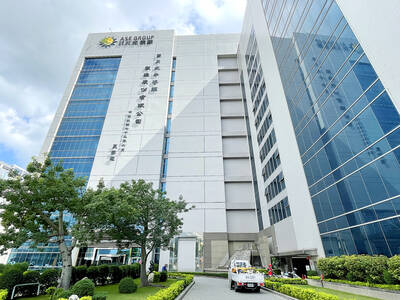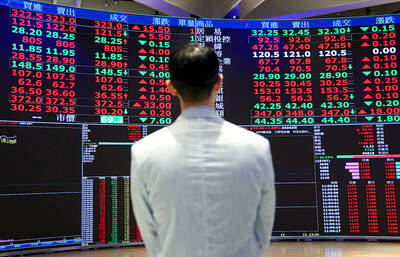The Ministry of Finance has reached a consensus with Ting Hsin International Group (頂新集團) to divide 11 seats on the board of Taipei Financial Center Corp (TFCC, 台北金融大樓公司), which owns the Taipei 101 building, between them.
The government may keep six seats after next Friday’s board meeting, in line with the 44 percent stake it controls in the company, a high-ranking ministry official said on condition of anonymity.
Ting Hsin, which owns Wei Chuan Foods Corp (味全食品) in Taiwan and the instant-noodle brand Master Kong (康師傅) in China, may gain five seats after increasing its shares in TFCC to 37 percent, the official said.
The packaged food maker recently gained another 5.25 percent of shares from Walsin Lihwa Co (華新麗華), a leading manufacturer of copper wire, cable and specialty steel in Taiwan and the region.
There are 13 seats on the board. Cathay Financial Holding Co (國泰金控) and Chinatrust Financial Holding Co (中信金控) each have one seat and will retain them, the official said.
Under the deal, the government will appoint TFCC’s chairperson and president while Ting Hsin will name the vice president, the official said. He refused to reveal whom the government favors for those posts, saying there may be a “last-minute surprise” before the board election.
However, acting chairman and president Harace Lin (林鴻明) may stay in his management post, the official said.
Meanwhile, the ministry will soon announce details of a long-term plan to improve the nation’s finances, the official said.

EXPANSION: The investment came as ASE in July told investors it would accelerate capacity growth to mitigate supply issues, and would boost spending by 16 percent ASE Technology Holding Co (ASE, 日月光投控), the world’s biggest chip assembly and testing service provider, yesterday said it is investing NT$17.6 billion (US$578.6 million) to build a new advanced chip packaging facility in Kaohsiung to cope with fast-growing demand from artificial intelligence (AI), high-performance-computing (HPC) and automotive applications. The new fab, called K18B, is to commence operation in the first quarter of 2028, offering chip-on-wafer-on-substrate (CoWoS) chip packaging and final testing services, ASE said in a statement. The fab is to create 2,000 new jobs upon its completion, ASE said. A wide spectrum of system-level chip packaging technologies would be available at

Taiwan’s foreign exchange reserves hit a record high at the end of last month, surpassing the US$600 billion mark for the first time, the central bank said yesterday. Last month, the country’s foreign exchange reserves rose US$5.51 billion from a month earlier to reach US$602.94 billion due to an increase in returns from the central bank’s portfolio management, the movement of other foreign currencies in the portfolio against the US dollar and the bank’s efforts to smooth the volatility of the New Taiwan dollar. Department of Foreign Exchange Director-General Eugene Tsai (蔡炯民)said a rate cut cycle launched by the US Federal Reserve

HEAVYWEIGHT: The TAIEX ended up 382.67 points, with about 280 of those points contributed by TSMC shares alone, which rose 2.56 percent to close at NT$1,400 Shares in Taiwan broke records at the end of yesterday’s session after contract chipmaker Taiwan Semiconductor Manufacturing Co (TSMC, 台積電) hit a fresh closing-high amid enthusiasm toward artificial intelligence (AI) development, dealers said. The TAIEX ended up 382.67 points, or 1.45 percent, at the day’s high of 26,761.06. Turnover totaled NT$463.09 billion (US$15.22 billion). “The local main board has repeatedly hit new closing highs in the past few sessions as investors continued to embrace high hopes about AI applications, taking cues from a strong showing in shares of US-based AI chip designer Nvidia Corp,” Hua Nan Securities Co (華南永昌證券) analyst Kevin Su

Nvidia Corp’s major server production partner Hon Hai Precision Industry Co (鴻海精密) reported 10.99 percent year-on-year growth in quarterly sales, signaling healthy demand for artificial intelligence (AI) infrastructure. Revenue totaled NT$2.06 trillion (US$67.72 billion) in the last quarter, in line with analysts’ projections, a company statement said. On a quarterly basis, revenue was up 14.47 percent. Hon Hai’s businesses cover four primary product segments: cloud and networking, smart consumer electronics, computing, and components and other products. Last quarter, “cloud and networking products delivered strong growth, components and other products demonstrated significant growth, while smart consumer electronics and computing products slightly declined,” compared with the